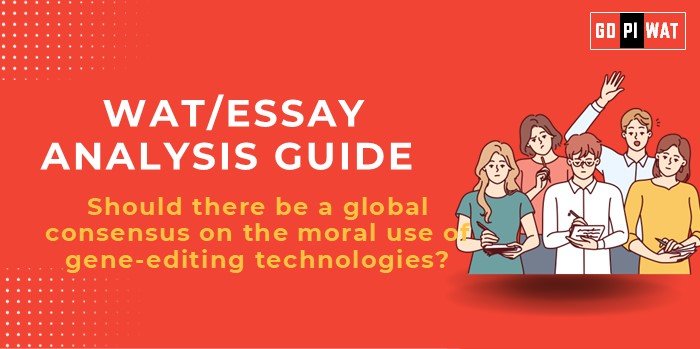📋 WAT/Essay Analysis Guide: Should there be a global consensus on the moral use of gene-editing technologies?
🌟 Understanding the Topic’s Importance
Gene-editing technologies redefine our understanding of science and ethics. For B-school students, analyzing this topic bridges biotechnology, policy, and leadership, offering insights into governance, innovation, and societal impacts.
⏳ Effective Planning and Writing
- 📝 Time Allocation: Planning: 5 min | Writing: 20 min | Review: 5 min
- 📚 Preparation Tips: Note ethical arguments, key statistics, and global perspectives.
📖 Introduction Techniques for Essays
- ⚖️ Contrast: “While gene-editing can eradicate genetic diseases, it risks creating societal inequalities.”
- 📜 Historical Context: “From the discovery of CRISPR in 2012 to recent ethical breaches, gene-editing’s journey has been both transformative and contentious.”
📚 Structuring the Essay Body
1. Achievements:
- 🏥 Highlight successes like disease eradication and improved food security.
2. Challenges:
- ⚠️ Discuss ethical dilemmas and regulatory gaps with examples.
3. Future Outlook:
- 🌍 Advocate for global standards while respecting cultural nuances.
🔚 Concluding Effectively
- 🌀 Balanced Perspective: “Gene-editing’s potential is immense, but global consensus is critical to ensure equitable and ethical use.”
- 🌐 Future-Oriented: “A robust international framework could unlock gene-editing’s benefits for humanity.”
📊 Analyzing Successes and Shortcomings
- ✔️ Achievements: Medical breakthroughs, agricultural resilience.
- ❌ Challenges: Ethical debates, regulatory inconsistencies.
- 🌎 Global Context: Compare global frameworks to highlight disparities and best practices.
💡 Recommendations for Sustainable Progress
- ✅ Create a WHO-led global ethical framework.
- 💰 Enhance funding for inclusive gene-editing research.
- 🗣️ Promote public awareness to address fears and misconceptions.
✍️ Sample Short Essays (100 Words Each)
1. Balanced Perspective:
“Gene-editing offers unprecedented possibilities, from curing diseases to improving food security. However, its unregulated use raises ethical concerns. A global consensus, led by international organizations, can ensure the technology is harnessed responsibly.”
2. Solution-Oriented:
“To balance innovation and ethics, global collaboration is essential. A shared framework, respecting cultural differences while establishing universal principles, can address challenges like access inequality and ethical misuse.”
3. Global Comparison:
“Countries like the US and Germany show contrasting approaches to gene-editing regulation. Learning from these models, a unified yet flexible global framework can address ethical and practical concerns.”


